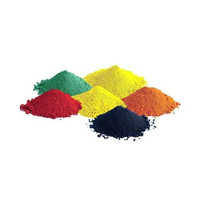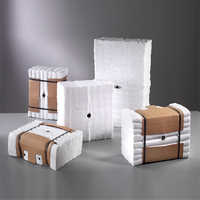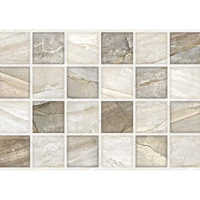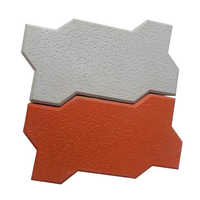Building Ceramic
(438 products)
Explore More Categories
Made in India
Good Smoothness And Low Dust Content Ceramic Fiber Modules
Price: 700 INR (Approx.)/Piece
MOQ - 500 Piece/Pieces
Product Type - Other, Ceramic Fiber Modules
Application - Industries, Heat Transfer Plant
2 Years
Business Type: Manufacturer | Distributor
GUNATIT CERAMICS
Made in India
Industrial Ceramic Fiber Module Chemical Composition: Nul
Price: 18,050 INR (Approx.)/Piece
MOQ - 1 Piece/Pieces
Product Type - Other, Industrial Ceramic Fiber Module
Application - Industrial
Grade - Industrial
Business Type: Manufacturer | Distributor
Earam Industries
Heat Resistant Ceramic Fiber Modules
Price: 500 INR (Approx.)/Square Foot
MOQ - 500 Square Foot/Square Foots
Product Type - Other, Ceramic Fiber Modules
Application - Industries, Heat Transfer Plant
Business Type: Trading Company
MMP TRADE SOURCING
Wall Mounted Ceramic Wash Basin
Price: 4500 INR (Approx.)/Piece
MOQ - 50 Piece/Pieces
Product Type - Ceramic Wash Basins
Application - Home, Bathroom
Business Type: Manufacturer | Supplier
MARK CERAMICS
Ceramic Wash Basin
Product Type - Ceramic Wash Basins
Business Type: Trading Company
Sunil Enterprises
10Mm White Ceramic Fiber Paper Size: 10 Mm
Price: 800 INR (Approx.)/Square Meter
MOQ - 15 Square Meter/Square Meters
Pulp Type - Chemical Mechanical Pulp
Width - 1000mm Millimeter (mm)
Style - Recycled
Business Type: Manufacturer
M/S VISHWAKARMA INSULATIONS
Ceramic Oval Size Wash Basin
Product Type - Ceramic Wash Basins
Business Type: Trading Company
Kalpesh Enterprises
Alumina Grinding Ball
Business Type: Manufacturer | Supplier
NOBEL CLAYART PRODUCTS
Floor Mounted Ceramic Wash Basin Grade: Premium
Price: 1500 INR (Approx.)/Piece
MOQ - 1 Piece/Pieces
Grade - Premium
Business Type: Distributor | Exporter
SONIS IMPEX
Hydro Foil Blade Of Rolling Glass Ceramics
Business Type: Manufacturer | Exporter
Jingniu Glass Ceramics Group Co., Ltd.
Alumina Ceramic Bead
Business Type: Manufacturer | Exporter
CeraTek Technical Ceramic Co., Limited
Perfect Shape Fancy Ceramic Fiber Module
Price: 800 INR (Approx.)/Square Foot
MOQ - 50 Square Foot/Square Foots
Product Type - Other, Fancy Ceramic Fiber Module
Grade - Industrial
Business Type: Manufacturer | Supplier
Highborn Technology Co., Ltd.
Fine Finish Printed Wash Basin
MOQ - 5 Piece/Pieces
Business Type: Manufacturer
Sumit Ceramic
Industrial Hydraulic Pipe Bending Mandrels
Price Trend: 3000.00 - 90000.00 USD ($) (Approx.)/Unit
MOQ - 1 Unit/Units
Business Type: Manufacturer | Exporter
LUOYANG DEPING TECHNOLOGY CO. LTD.
Wall Mounted Wash Basin
Product Type - Ceramic Wash Basins
Business Type: Trading Company
Maharaja Traders
White Ceramic Wash Basin Application: Bathroom
Price: 1000 INR (Approx.)/Set
MOQ - 10 Set/Sets
Product Type - Ceramic Wash Basins
Application - Bathroom
Grade - A
Business Type: Distributor | Supplier
Plumbing Impex
Sanitary Ware Wash Basin Grade: A
MOQ - 1000 Piece/Pieces
Product Type - Ceramic Wash Basins
Grade - A
Business Type: Manufacturer | Exporter
PAJARO ELEGANCE
Calcium Lignosulphonate Powder
Business Type: Manufacturer | Distributor
HUBEI RBS CHEMICAL CO.,LTD.
White Square Wash Basin Application: Bathroom
MOQ - 5000 Box/Boxes
Application - Bathroom
Grade - Superior
Business Type: Manufacturer | Distributor
Bhavani Ceramics
Ceramic Fiber Modules Gender: Women
Business Type: Supplier | Trading Company
S.K.GUPTA PVT. LTD.
Designer Ceramic Wash Basin Application: For Bathroom
Price: 7500 INR (Approx.)/Piece
MOQ - 100 Piece/Pieces
Product Type - Ceramic Wash Basins
Application - For bathroom
Grade - A Grade
Business Type: Manufacturer | Supplier
Cura Sanitaryware LLP
Ceramic Designer Wash Basin
Product Type - Ceramic Wash Basins
Business Type: Manufacturer | Exporter
Aqua Cera
Homemade Chocolate
Business Type: Manufacturer | Distributor
FOGLAND EXPORTS
Ceramic Wash Basins
Business Type: Trading Company
Kisan Sanitary & Hardware Store
Luxury Bathroom Wash Basin
Price: 1200 INR (Approx.)/Box
MOQ - 10 Box/Boxes
Product Type - Ceramic Wash Basins
Business Type: Supplier | Trading Company
Sargam Tiles
Ceramic Pedestal Wash Basin
Business Type: Manufacturer | Supplier
V. B. NARANIA & COMPANY
Crius Handmade Ceramic Wash Basin Application: Home
Price: 15000 INR (Approx.)/Piece
MOQ - 1 Piece/Pieces
Product Type - Ceramic Wash Basins
Application - Home
Business Type: Manufacturer | Trading Company
Crius World
Ceramic Vanity Wash Basin Grade: A
MOQ - 3000 Box/Boxes
Product Type - Ceramic Wash Basins
Grade - A
Business Type: Exporter
HIMSONS INTERNATIONAL
Building Ceramic Manufacturers | Suppliers in India
| Company Name | Location | Member Since |
|---|---|---|
| Gunatit Ceramics | Chandrapur, India | 2 Years |
Building & Construction Materials & Supplies: Types and Uses
1. Mud and Clay
The proportions of these materials determine the final architectural form. Soil quality is frequently a determining factor. Soil with high clay content is ideal for the cob/adobe construction method, whereas soil with low clay content is more suitable for the sod method. Sand, gravel, and straw/grasses make up the rest of the key materials. Traditionally, rammed earth walls were built by hand by compressing clay soils between boards; today, however, forms and mechanical pneumatic compressors are employed to achieve the same result.
2. Concrete
A composite material, concrete is produced by combining cement, aggregates (such as sand or crushed stone), and water. Changing the mix design can drastically alter the concrete's qualities. Therefore, it is common practice for concrete suppliers to list the patch's specific material qualities and accompanying test results.
3. Masonry
Masonry can refer to both the process of constructing buildings from of distinct components and the mortar used to bind them together. Brick, building stone such granite, marble, limestone, adobe, concrete block, glass block, and cast stone are the primary materials used in masonry construction. This substance is included in the category of building supplies.
4. Rock
As far back as human memory can go, there have been buildings made of rock. It's the most durable and widely accessible option for construction. While rock's density makes it an effective shield, the material's bulk and awkwardness are its principal drawbacks. Constantly heating stone requires a lot of energy and is therefore inefficient.
5. Steel
Because steel is a costly material, it is the structural engineer's job to select economical sizes and shapes based on the building's real loads to prevent overdesign. Steel has a high tensional and compressional strength, making it a formidable building & construction material & supplies material. The excellent strength-to-weight ratio of this material makes it perfect for usage in the skeletons of skyscrapers and massive manufacturing complexes.
6. Timber (wood)
Cupboards, railings, cabinets, shelves, tables, windows, etc., are all made of timber inside the house. Plywood and raw wood are two more common forms of timber use. Solid wood or timber is used to make products like ply blocks and ply boards, hefty patterned doors, and windows.
7. Brush
Brush houses are typically found in tropical and subtropical settings, such rainforests, because they are made entirely of plant components and huge leaves may be used in construction. Traditional Native American dwellings were typically made of brush.
8. Blocks
Usually, concrete or cement is used to make blocks. A hollow core can be used to save weight and increase insulation in these. They have several modern applications, including in foundations, load-bearing walls, retaining walls, and partitions.
9. Ice
The Inuit used ice for their igloos, but it has also been used to build hotels made entirely of ice as a tourist attraction in the Arctic during the winter.
10. Bricks
Bricks are a common form of block used in masonry for constructing a variety of different structures and surfaces. Although originally referring to a block made from dried clay, the term brick is now commonly used to refer to other blocks used in building construction that have been cured using chemicals.
11. Metal
Large buildings, such as skyscrapers, often use metal for either the framework or the exterior surface. The construction industry makes extensive use of numerous metal varieties. Steel, an iron-based alloy, is the material of choice for most metal structures. It can be durable and long-lasting if it is refined properly and/or treated to enhance its strength and/or flexibility. Metal's main adversary in terms of durability is corrosion.
12. Aggregate
Aggregate, or construction aggregate, refers to a wide variety of coarse to medium-grained particle materials used in construction, such as geosynthetic aggregates, gravel, crushed stone, sand, slag, and recycled concrete. The mining industry relies heavily on aggregates.
13. Fly Ash
After pulverized coal is burned in power plants, a fine powder known as fly ash is produced. Pozzolans like fly ash, which contain aluminous and siliceous material and harden when exposed to water, are used to make cement. Most cement-based products, including poured concrete, concrete block, and brick, can benefit from the addition of fly ash as a primary element.
14. Ceramics
Items like tiles and plumbing fittings are examples of ceramics. Ceramics are typically installed as fixtures or utilized as a covering in interior spaces. Everything in the house is made of ceramic tile, from the flooring to the walls to the countertops to the ceilings. There was a time when ceramics were only a subset of pottery made from clay and fired in kilns, but now the field has expanded into more scientific and technical realms.
15. Binding Wires
To tie things together, builders often turn to Binding Wire. It is widely employed in the building trade for securing rebars at joints. Binding wire, also known as annealed wire, is constructed of mild steel.
What is the importance of building construction materials & supplies?
1. Improve Efficiency and Productivity
In order to cut costs, the construction sector frequently focuses on labor costs. Savings in this area are often attained by cutting back on labor hours and compensation. However, increasing worker productivity can help reduce expenses but is typically disregarded.
2. Reduce or do away with material handling that is already done.
Material handling, which can take up to 40% of a team's time on a construction site, is another cause of decreased labor productivity and its associated expenses. Tools for planning, organizing, and keeping tabs on materials are essential components of any material management system. These allow items to be dumped and kept in the best possible spot on prepared locations.
3. Reduce the Possibility of Loss from Theft or Bad Weather
Incorrect scheduling leads to construction supplies sitting idle at a job site for longer than necessary. This reduces the risk of theft and protects them from weather conditions that could cause damage.
4. Lessen the amount of stuff that is thrown away
When properly implemented, material management systems guarantee not only the availability of required materials but also their appropriateness in terms of both quality and quantity. Buying the wrong materials for a building project can cause issues ranging from minor delays to major safety risks. If the wrong materials are used for a project and it is delayed or doesn't satisfy code standards, the contractor may be held liable for financial damages.
5. Better Budget Predictions
Even when everything is working smoothly, a construction project's expenses will be heavily weighted toward the cost of materials and labor. However, when issues arise, expenses can quickly escalate because of lost time and lowered output. If you have a better idea of what you have on hand and what you'll need in the future, you can make more informed decisions about how much money to allocate toward upgrades and modifications.
What is the meaning of building construction materials & supplies?
Material brought to the construction area by the Contractor or a subcontractor for use in the construction of the building or the performance of the work is referred to as "construction material." It also encompasses anything that has been prefabricated off-site and sent to the construction site. Construction materials include everything from lumber to drywall. Clay, pebbles, sand, wood, even twigs and leaves have all found uses in building construction. The world relies on a wide variety of synthetic and less synthetic man-made items in addition to natural ones.
Suppliers of raw materials used by construction businesses in constructing commercial and residential properties make up the construction materials sector. Brick, stone, concrete, and cement, as well as wood, timber, wood paneling, and mill work products, are all considered primary construction materials.
What construction materials & supplies are used for building houses?
There are four common construction materials and supplies mostly used for building houses:
1. Steel
Steel is a metal alloy composed primarily of iron and carbon, with small amounts of other alloying materials added to increase its strength and fracture resistance.
2. Concrete
Fine and coarse aggregates like gravel, crushed stone, recycled concrete, and geosynthetic aggregates are combined with a liquid binder like cement to form concrete, a composite material that hardens or cures over time.
3. Stone
Stone, which has been used for construction in this region for thousands of years, is the material of choice for its durability. In truth, the world's oldest surviving structures are primarily constructed from stone.
4. Brick
In masonry construction, individual building blocks (like bricks) are used to erect a structure, and the blocks are held together with mortar. Bricks were traditionally made by pressing clay into a mold and then firing the finished product in a kiln.
Conclusion
Although there is much more that can be said about building materials, I believe that the information presented here should provide a solid foundation for further study. Construction materials are selected based on their ability to withstand the loads and pressures placed on the building while remaining affordable.
FAQs: Building & Construction Material & Supplies
Q. How do I start a building & construction material supplies business in India?
Ans Here are the initial steps:
- Get in touch with manufactures or distributors of the necessary components
- A proper locale selection is essential.
- Set Up Transportation for the Company
- Using any kind of construction material requires a permit
- Estimate the price tag
- Hire only dependable people
- Advertising should be your primary concern
Q. How many types of building construction materials & supplies are used in construction?
Ans. Stone and wood are examples of natural construction materials, while concrete and steel are examples of man-made building materials.
Q. Where can I buy building construction materials & supplies online at a low prices?
Ans.You can buy budget friendly construction materials by visiting indiamart.
Q. What is the cost of building construction materials & supplies?
Ans. All together, the price per square foot for building supplies comes to somewhere between Rs. 1,000 and Rs. 1,500.
Related Categories
AAC Blocks
Aluminum Composite Panels
Architectural Hardware
Bathroom & Toilet Accessories/Fittings
Bricks
Bright Bars
Bucket Elevator
Builders & Construction Hardware
Building Facilities
Building & Construction Material & Supplies
Building Ceramic
Building Coating
Building Glass
Building Metallic Materials
Building Plastic
Bus Shelter
Cement & Sand
Chimney
Clean Room Equipment
Commercial & Residential Land
Commercial Property
Construction Chemicals
Construction Equipment
Construction Machinery
Construction Materials Stocks
Decorative Laminates
Doorbell
Doors/Windows Accessories & Fittings
Doors/Wooden Door Panels
Elevators, Lifts & Escalators
Fabricators
Fire Bricks
Fireproof/Flameproof Materials
Floor Tiles
Flooring
Fountains
Furniture Fittings & Fixtures
Gates & Grills
Glass & Glass Products
Granite
Heat Insulation
Hooks & Mounts
Industrial Property
Lime & Lime Products
Locks
Manhole Covers
Marble
Modular Toilet
Nozzles
PVC Doors
PVC Products
Paint & Allied Products
Paint Brushes
Painting Equipments & Maintenance
Plywood
Portable Cabins
Prefabricated & Portable Buildings
Property For Lease
Property For Rent
Real Estate Agents
Residential Property
Roof Tiles
Roofing Systems
Sandstone
Sanitaryware
Scaffolding
Sheet Metal
Slate Stone
Slotted Angles
Sluice Gate
Soundproofing Materials
Stone
Texture Paint
Tiles
Timber, Timber Products & Plank
Undertaking Contracted Projects
Vinyl Flooring
Wall Materials
Wall Tiles
Wallpaper
Water Tanks
Waterproof Materials
Waterproofing Chemicals



